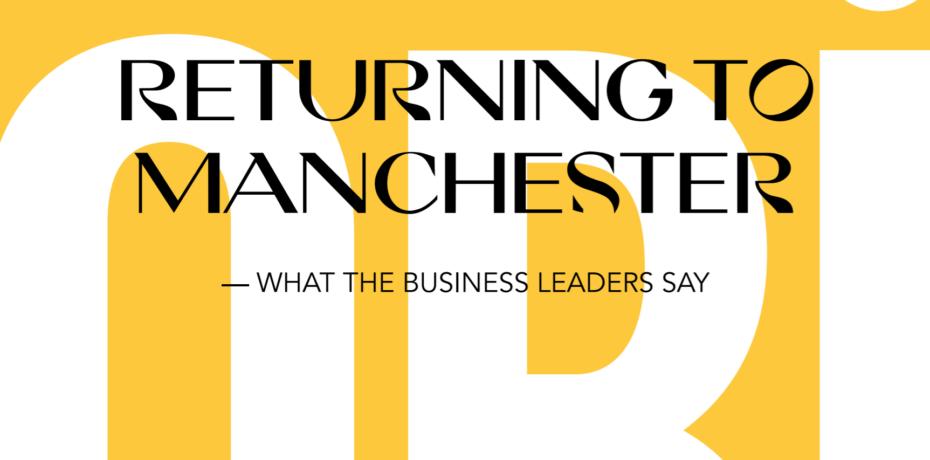Commentary
COMMENT | How to spur the office return – an OBI survey
 OBI has undertaken a survey of more than 100 of Manchester’s business leaders across a range of firm sizes, in an attempt to assess views on a full return to the workplace, writes Jordana Anderson of OBI.
OBI has undertaken a survey of more than 100 of Manchester’s business leaders across a range of firm sizes, in an attempt to assess views on a full return to the workplace, writes Jordana Anderson of OBI.
City centres are the engine of our economy. It scarcely needs pointing out that footfall throughout city centres fell dramatically during the pandemic, but the slowness of the return to anything like ‘normal’ is now causing financial worry.
Nationally, total footfall has recovered reasonably well to around 56% of the norm, boosted by the Government’s Eat Out to Help Out scheme, but major business centres like Manchester, London and Edinburgh are recovering much more slowly. Manchester’s city centre management company CityCo documented the total footfall in August 2020 and found that it was down by 44.8% year-on-year in Manchester.
So what is on business’ minds?
The survey results have given us crucial insights into the full picture of when businesses expect their workforces to return to the city.
Out of 105 city centre-based businesses, 58% have not yet returned to the city and in some cases say they will not return until January. What does this mean for businesses and the economy?
Our survey identified the key trends creating a barrier to employees not wanting to return to the office.
The findings highlight:
- The largest percentage of employees back in the office are smaller businesses with 1-50 employees
- Almost half (45%) of businesses expect to return to the office between September and October
- The two main concerns about the return to the office are the commute to the city and Covid-19 in the office environment
- Increased confidence around the safety of using public transport will entice commuters into the the office and city centre
- The provision of better value car parking will also assist in bringing more businesses back to the workplace
- The reopening of schools and childcare will help parents return to the workplace
So, how can we overcome some of these barriers?
Travel
Public transport is of huge concern. The perception is that it’s busy, and that commuters are at the mercy of the other people’s behaviour. To mitigate their fears, the city needs to explore new ways to encourage the use of public transport, for example, higher frequency of trams, trains and buses are surely needed to spread passengers out – obviously this is not cheap.
We also need to see innovations focused on encouraging health and safety when using public transport or ‘active travel’, such as touchless fare collection, hand sanitiser stations, smartphone apps that help riders decide the best time to travel, safer bike routes and increased bike storage.
Selected comments on transport from survey participants:
- “Public transport is Manchester’s Achilles heel. It’s expensive, unreliable (particularly trains), slow and time-consuming”
- “My employees are reluctant to return as public transport is expensive, not frequent enough and overcrowded, and the only other option is to drive but parking is extortionate[ly priced] and limited”
As a short-term fix, it would be beneficial to offer discounted parking for workers in the city. One-third (31%) of respondents agreed that Manchester could encourage more businesses to reopen or rebuild their presence in the city by offering affordable parking and 12% agreed that discounted public transport for workers would also benefit.
Obviously, discounted parking raises the potential for congestion returning, however if employees are offered flexible hours and staggered days this could be reduced – so business leaders need to play their part.
The workplace
Just over half (53%) of business owners stated that
they had made physical alterations to their offices, with measures including hand sanitiser stations, desk partitions, fewer desks and staggered employee days in the office, one-way systems and temperature checks.
Some of the concerns were a lack of fire wardens in larger offices, no health and safety staff on site and air conditioning not being fit for purpose.
Ultimately, the workplace of the future will need to change and adapt but, in the meantime, leaders must act now to ensure workplaces are both productive and safe.
Selected participant comments:
- “For any business to prosper, you need to harness and build upon its culture over time. Business innovation comes from collaboration in person too”
- “Business leaders need to lead by setting an example to their employees on the benefits of getting back to the workplace safely and responsibly”
Our view
Business leaders aren’t generally shy on selling themselves on innovation and flexibility. Keeping appropriate safety measures in mind, it’s time that actions matched these words, because an economic emergency is unfolding.

The shops, cafes and bars that make Manchester such a vital and inspiring place need office users to return, even if that’s on a reduced or staggered basis. As the furlough scheme reaches its end, the coming weeks could be a make-or-break time. It’s on all of us to support each other, support Manchester and do what we can to bring the buzz back to the city.
- Jordana Anderson is part of the transactions and asset management team at OBI




